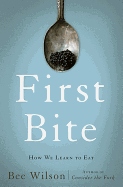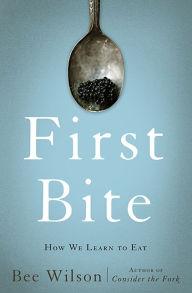
 As physical nourishment, a social bonding agent and cultural identity, food is central to human life. Although tastes and cuisines vary wildly across cultures, nearly all of us form powerful habits and attitudes about food from early childhood. These learned behaviors and principles, as well as cultural messages and conversations about food, can have a powerful effect on the rest of our lives. Food writer and social historian Bee Wilson examines eating patterns in the context of weaning, baby food, family meals, eating disorders and nutrition in her fifth book, First Bite.
As physical nourishment, a social bonding agent and cultural identity, food is central to human life. Although tastes and cuisines vary wildly across cultures, nearly all of us form powerful habits and attitudes about food from early childhood. These learned behaviors and principles, as well as cultural messages and conversations about food, can have a powerful effect on the rest of our lives. Food writer and social historian Bee Wilson examines eating patterns in the context of weaning, baby food, family meals, eating disorders and nutrition in her fifth book, First Bite.
Wilson (Consider the Fork) begins with a simple premise: humans are born with an innate hunger for food, but nearly everything else that concerns food--tastes, aversions, habits, disorders, attitudes--is learned. There are hundreds of reasons that people relate to food in complicated, often unhealthy ways; Wilson herself has some experience with this, both personal and familial. However, she argues, it is possible to change some of that behavior, to make food "a daily source of delight rather than something to fight against." She draws on a variety of research to explore the complex relationship humans have with food, which often begins as early as toddlerhood.
Wilson explores the connection between food and memory (encompassing both Proust and favorite childhood meals), the influence of siblings (establishing taste as one's identity within the family), and school lunches and other institutional food (with plenty of fascinating historical context). She admits the difficulty of changing food-related behavior and attitudes for a range of people: picky toddlers, veggie-averse teenagers and those who struggle with eating disorders. At the end of each chapter, she highlights a single food that encapsulates that chapter's concept (beets for Likes and Dislikes, milk for Memory, birthday cake for Children's Food). Although she occasionally gets bogged down in the research, Wilson gleans some fascinating insights from food scientists, nutritionists and her own typically complicated history with food.
"Taste may be identity, but it is not destiny," Wilson asserts. She makes the case for thoughtful eating, intentional meal planning and a willingness to experiment with new foods. First Bite is both a rich social history for those interested in the relationship people have with food and an encouraging word for harried parents hoping to expand their children's culinary horizons. Since the human need for food is constant and vital, Wilson points out, there is always the opportunity for change and growth--one bite at a time. --Katie Noah Gibson, blogger atCakes, Tea and Dreams
Shelf Talker: Social historian Bee Wilson examines the complicated relationship humans have with food, and its origins in early childhood.

